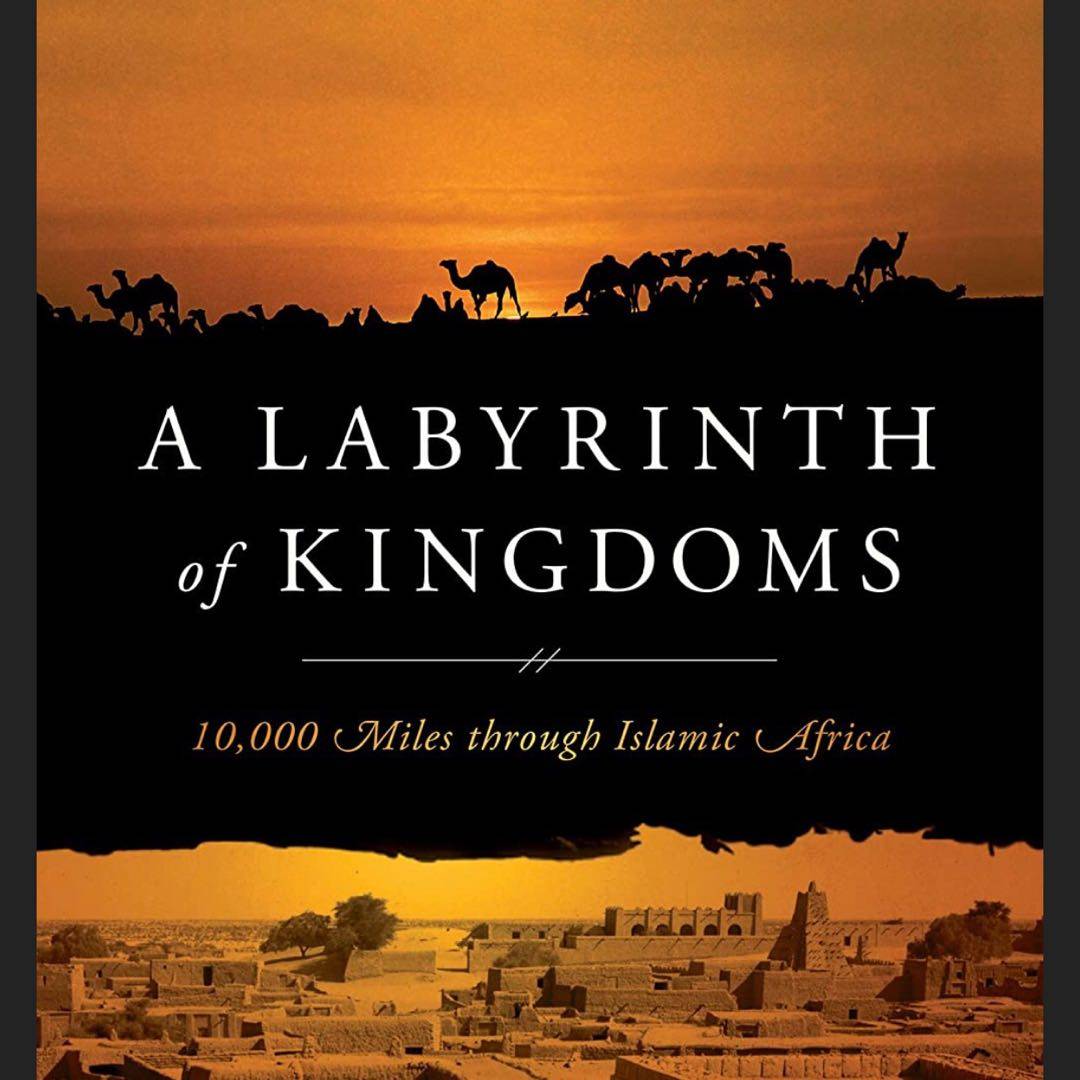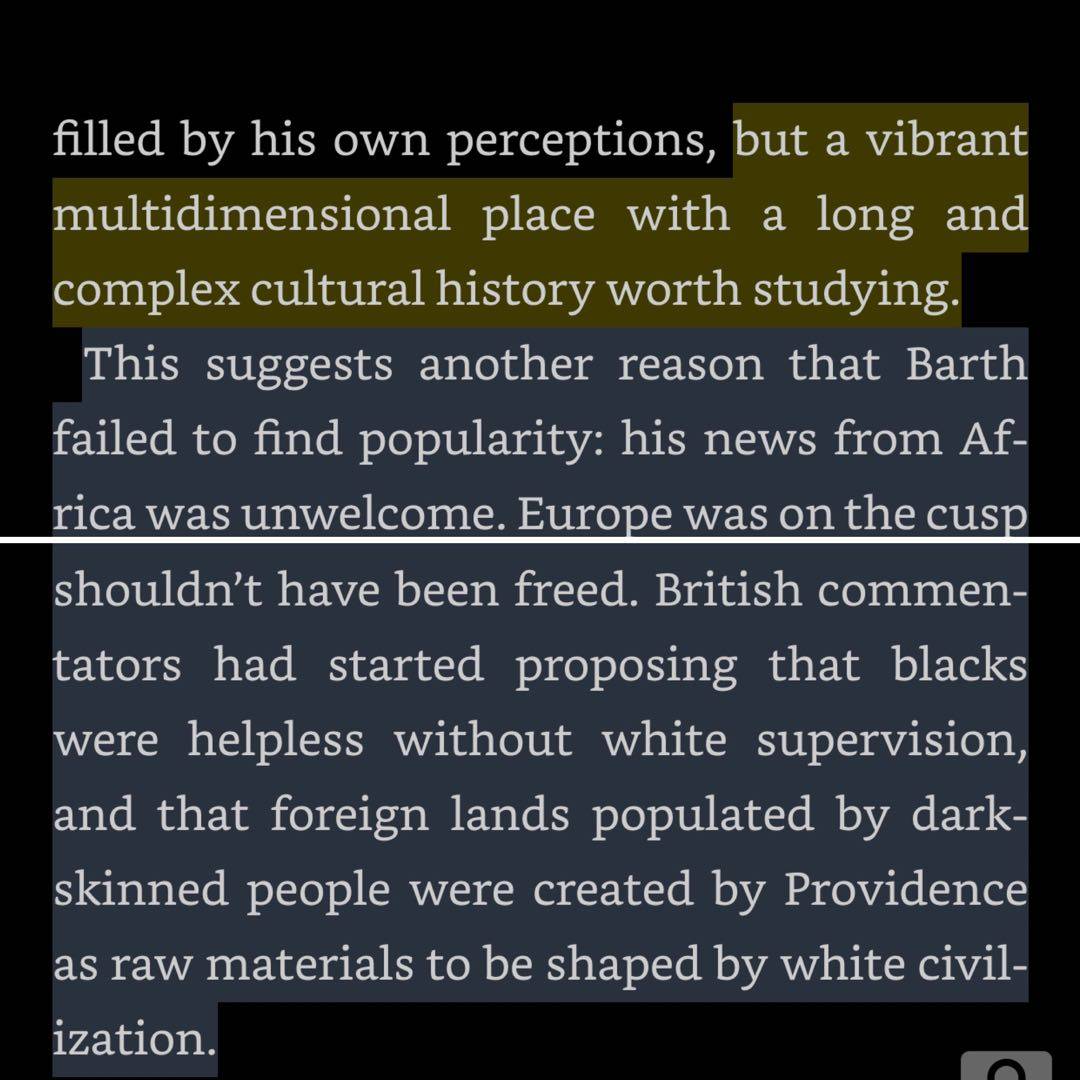
#12coloursofdecember Dec 22 Cozy Fire Orange 10 points plus 1 #wintergames #merryreaders @Clwojick

#12coloursofdecember Dec 22 Cozy Fire Orange 10 points plus 1 #wintergames #merryreaders @Clwojick

Barth never became popular, his views of Africa not in line with the rest of Britain.
His view: Africa is a “vibrant multidimensional place with a long and complex cultural history worth studying.”
Britain: Africa was “populated by dark-skinned people created as raw materials to be shaped by white civilization” and that “blacks were helpless without white supervision.”
And thus the colonial period began...

The title of the book makes its debut 71% into the book:
“The caravan was slogging through a network of creeks and swamps that laced the northern bank of the Niger. Some of them were choked with water lilies. The landscape gave Barth ample opportunity to use one of his favorite words: labyrinth.”

Books save the day!
”Barth included a request [to the foreign office] from al-Bakkay for “a series of Arabic books,” most on Islam, but also on history, medicine, poetry, and any other works of interest. ... Such books, wrote Barth, “have had a greater effect in reconciling the men of authority in Africa to the character of Europeans than the most costly present ever made to them.””

Explorer Heinrich Barth was an exceedingly serious man. But frustrated by rumors he was spying, he made a joke:
“He [said he] had made the difficult trip to Timbuktu...because the British government had heard that the natives “fed on sand and clay,” so his government sent him to learn how it was done “in order to provide in a similar way for the poor in our own country.” As the accuser looked bewildered, the sheikh roared with laughter.”

What early explorers went through amazes me, not least of which constant war, corruption, and the horrors of the guinea worm, which I will refrain from describing so Littens can keep their stomachs.
“Barth rarely mentioned the psychological toll of constant stress, and handled it well. He always mustered the energy and will to continue, to pursue the promise of the region ahead, the next landscape, the new peoples and languages.”

”Barth assumed that certain attributes and practices ... divided the civilized from the barbaric. When the elements got mixed—nakedness with skilled architecture—it upset his categories of thinking. This was frequently the dilemma of a European in Africa: how to reconcile African refinement with African barbarity? Most explorers didn‘t try, choosing certainty over nuance and ambiguity. Barth was open-minded enough to widen his thinking.”

🐘 ❤️🐘 ❤️🐘
“After noting lots of elephant tracks and dung near the shoreline, Barth finally saw “one of the most interesting scenes which these regions can possibly afford”—a herd of ninety-six elephants, “arranged in a natural array like an army of rational beings, slowly proceeding to the water.” He sketched them.”

The leader of Barth‘s expedition desperately wanted to end slavery but he learned it was an entrenched and massive part of African culture in the 1840s, and was brutal beyond words. Thousands were enslaved in Africa. His exposure to the brutalities disillusioned him and he lost hope because even if “white” countries ended their slave trading, slavery would nonetheless continue. How tragic that slavery makes up such a huge part of human history.

German Heinrich Barth was an early explorer, about whom we know very little compared to other African explorers, despite his scholarly and unprejudicial analysis of cultures.
“Unlike most African explorers...Barth was a gifted linguist who got his information firsthand. He spoke seven African languages and compiled vocabularies for twenty-four, which allowed him to talk to everyone from kings and viziers to merchants, imams, thieves, and slaves.”

Up next! #LetterL for #LitsyAtoZ and another for #nonfiction2019

I just bought the bottom three nonfiction Kindle books, all on sale on Bookbub for $2.99 or less (gosh I love this newsfeed) so I can work on my #nonfiction2019, and the top two on the right were free. Of course I‘m still reading the English history book.